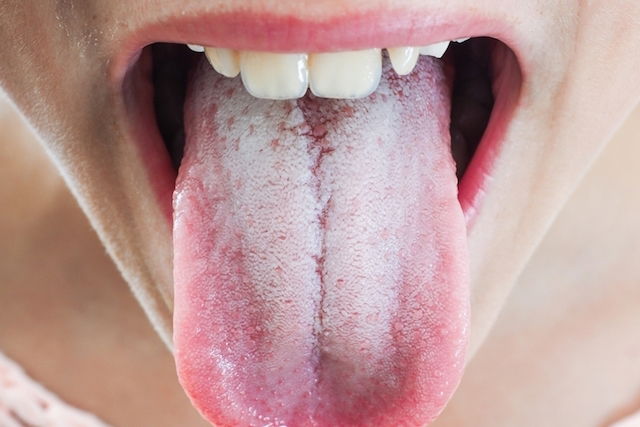A burning sensation on the tongue is a relatively common symptom, especially after burning your tongue on a very hot drink like coffee or hot milk. This symptom can also emerge for no obvious reason, which may indicate an underlying health problem, like a nutritional deficiency, oral irritation or dry mouth syndrome.
If your tongue burns suddenly or lasts for longer than 2 or 3 days, you should see your dentist or doctor for an assessment to identify a cause and start treatment as necessary.
The most common causes of a burning tongue are:

1. Consuming hot, spicy or acidic food or drinks
This is the main cause of tongue burning that happens to everyone at least once in a lifetime. The burning emergrd because hot temperature can burn the tongue, lips, gums and cheek tissue. Acidic foods like citric fruits, and spicy food can also damage the tongue and cause burning. Most times, the burn is mild but it can cause discomfort and loss of sensitivity for up to 3 days.
How to treat: To relieve symptoms, you should opt for cold food and drinks and avoid hot ones until symptoms resolve. You should let your food cool before eating it. Avoiding spicy food and citric foods like kiwifruit, pineapple and grapefruit can also help, as well as maintaining good oral hygiene. You should see your doctor if the burn is severe.
2. Dry mouth
Dryness in the mouth occurs when salivary glands do not produce sufficient amounts of saliva to keep the tongue and oral mucosa moist. When this happens, it is normal to feel burning or tingling on the tongue.
Some of the most frequent causes of dry mouth include problems in the salivary glands or use of medications. In addition illnesses that compromise the immune system like Sjögren syndrome, AIDS and diabetes can also lead to dry mouth. Many women experiencing hormonal changes may also notice dry mouth, especially during specific periods like during menstruation.
How to treat: When you notice you have a dry mouth, increase your fluid intake or chew on a piece of gum to simulate saliva production. If your dryness lasts for a long time, you should see your doctor for assessment identify a cause and start appropriate treatment.
3. Lack of vitamin B
A deficiency in B complex vitamins generally causes mild inflammation in the mouth, leading to symptoms like burning on the tongue, gums and cheeks. A lack of minerals like iron and zinc can also trigger these symptoms.
Vitamin B deficiency is more common in people who do not eat a varied diet or in people with more restrictive diets, like vegetarians or vegans.
How to treat: Ideally, you should maintain a varied diet. However, if you suspect you may be deficient in Vitamin B, you should see your doctor for a blood test and start supplementation as prescribed.
4. Yeast infection
A yeast infection, known as oral thrush, can emerge on the tongue, especially when proper oral hygiene is not practiced. These infections can cause tingling or burning on the tongue, as well as bad breath or a white tongue.
How to treat: Normally, an infection can be managed with adequate oral hygiene twice per day. However, if symptoms do not resolve with 1 week, you should see your doctor, as treatment with antifungals may be necessary.
5. Burning mouth syndrome
This syndrome is relatively rare and is characterized by a burning sensation on the tongue, lips, palate and other areas of the mouth. It emerges for no apparent reason and can last for years. In addition, you may experience other symptoms like tingling and changes to taste. This syndrome most commonly affects women over the age of 60.
The exact causes of burning mouth syndrome are not entirely known, however it is associated with excess stress, anxiety and depression. Learn more about the symptoms and treatment of burning mouth syndrome.
How to treat: If you suspect you may have burning mouth syndrome, you should see your doctor to confirm a diagnosis and rule out other possible causes. The doctor may prescribe oral mouthwashes and medication like low dose tricyclics antidepressants, benzodiazepines or anticonvulsants. Treatment depends on the physical exam, test results and health history of each patient.
When to go to the doctor
Usually, burning tongue resolves quickly by maintaining adequate oral hygiene and drinking at least 2 L of water per day. However, you should see the doctor if:
- Burning lasts for over 1 week
- You have difficulty eating
- Other symptoms emerge like white tongue, bleeding or intense halitosis
In these cases, you should consult your dentist or doctor for assessment so that a cause can be identified and appropriate treatment can be initiated.
